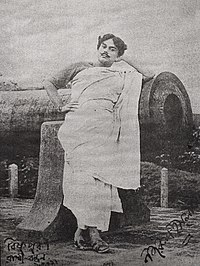| Bidrohi | |
|---|---|
| by Kazi Nazrul Islam | |
| Original title | বিদ্রোহী |
| Written | December 1921 |
| First published in | 6 January 1922 |
| Country | British India |
| Language | Bengali |
| Subject(s) | Rebellion, protest |
| Genre(s) | Rebel Poetry |
| Publisher | Bijli |
| Lines | 139 |

"Bidrohi" (Bengali: "বিদ্রোহী"; English: "The Rebel") is a popular revolutionary Bengali poem and the most famous poem written by Kazi Nazrul Islam in December 1921.[1][2][3] Originally published in several periodicals, the poem was first collected in October 1922 in a volume titled Agnibeena: the first anthology of Nazrul's poems. Many have seen, in this poem, elements of romanticism, heroism, and love.[4][5][6] Syed Ali Ahsan wrote that the poem was inspired by Walt Whitman's "Song of Myself".[1]
- ^ a b "Vignettes of brilliance". 24 May 2012. Retrieved 25 June 2016.
- ^ Huda, Mohammad Nurul (1986). Flaming Flower: Poets' Response to the Emergence of Bangladesh (1st ed.). Dhaka: Bangla Academy. p. 189.
- ^ "A tribute to Bengal's rebel and revolution". Archived from the original on 11 August 2016. Retrieved 25 June 2016.
- ^ Langley, Winston E. (2009). "The spirit of rebellion and creation". Kazi Nazrul Islam The Voice of Poetry and the Struggle for Human Wholeness. Dhaka: Nazrul Institute. p. 41. ISBN 984-555-384-2. OCLC 173249071.
- ^ Gowswami, Karunamaya (1989). Kazi Nazrul Islam: A Profile. Dhaka: Nazrul Institute. p. 6.
- ^ Chowdhury, Kabir (1997). "Kazi Nazrul Islam: His Revolt and Love". In Mohammad N. Huda (ed.). Nazrul: An Evaluation. Dhaka: Nazrul Institute. p. 87.
© MMXXIII Rich X Search. We shall prevail. All rights reserved. Rich X Search
